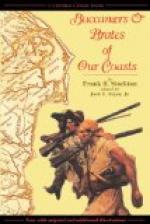The buccaneers of the West Indies and South America had grown to be a most formidable body of reckless freebooters. From merely capturing Spanish ships, laden with the treasures taken from the natives of the new world, they had grown strong enough to attack Spanish towns and cities. But when they became soldiers and marched in little armies, the patience of the civilized world began to weaken: Panama, for instance, was an important Spanish city; England was at peace with Spain; therefore, when a military force composed mainly of Englishmen, and led by a British subject, captured and sacked the said Spanish city, England was placed in an awkward position; if she did not interfere with her buccaneers, she would have a quarrel to settle with Spain.
Therefore it was that a new Governor was sent to Jamaica with strict orders to use every power he possessed to put down the buccaneers and to break up their organization, and it was to this end that he set a thief to catch thieves and empowered the ex-pirate, Morgan, to execute his former comrades.
But methods of conciliation, as well as threats of punishment, were used to induce the buccaneers to give up their illegal calling, and liberal offers were made to them to settle in Jamaica and become law-abiding citizens. They were promised grants of land and assistance of various kinds in order to induce them to take up the legitimate callings of planters and traders.
But these offers were not at all tempting to the Brethren of the Coast; from pirates rampant to pirates couchant was too great a change, and some of them, who found it impossible to embark on piratical cruises, on account of the increasing difficulties of fitting out vessels, returned to their original avocations of cattle-butchering and beef-drying, and some, it is said, chose rather to live among the wild Indians and share their independent lives, than to bind themselves to any form of honest industry.
The French had also been very active in suppressing the operations of their buccaneers, and now the Brethren of the Coast, considered as an organization for preying upon the commerce and settlers of Spain, might be said to have ceased to exist. But it must not be supposed that because buccaneering had died out, that piracy was dead. If we tear down a wasps’ nest, we destroy the abode of a fierce and pitiless community, but we scatter the wasps, and it is likely that each one of them, in the unrestricted and irresponsible career to which he has been unwillingly forced, will prove a much more angry and dangerous insect than he had ever been before.




